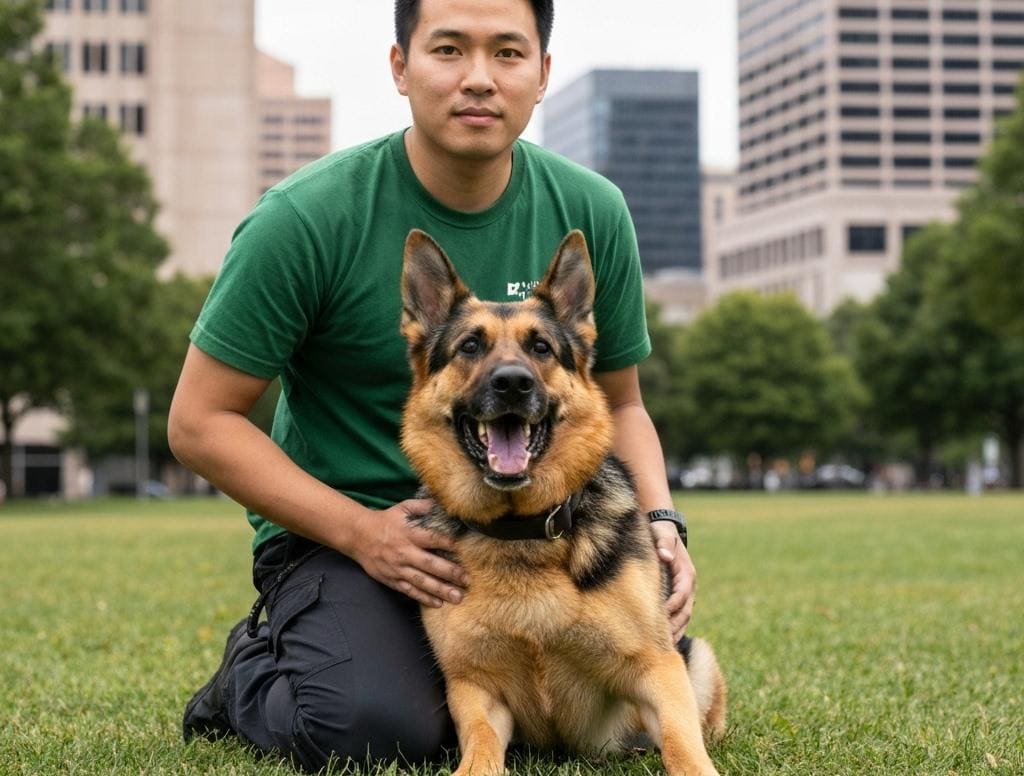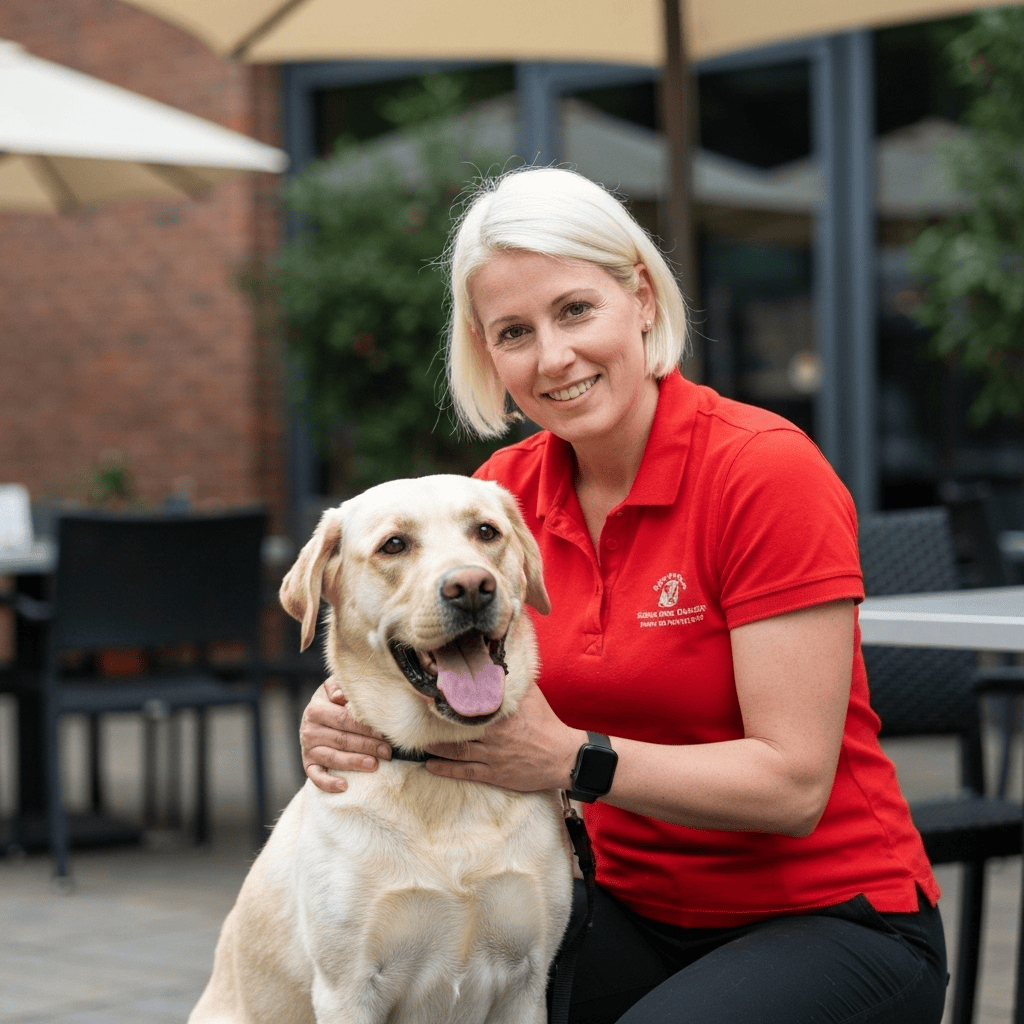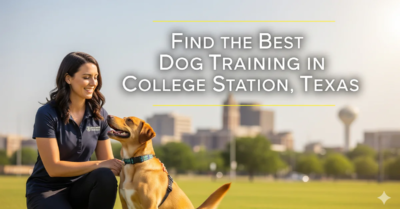Your Complete Guide to Choosing a Dog Trainer in College Station
Living with a dog in College Station means dealing with some pretty unique situations. One day you’re walking peacefully through Wolf Pen Creek, and the next you’re navigating crowds of rowdy Aggies heading to Kyle Field on game day. Your dog needs to handle apartment elevator rides, busy Northgate sidewalks, and the constant stream of joggers and cyclists around campus.
If you’re looking into dog training in College Station tx, you probably already know your pup needs some help with these daily challenges. The good news is that the right trainer can make a huge difference in how well your dog handles everything this college town throws at them.
How to Choose the Right Trainer
The most important thing to look for is a trainer who uses positive reinforcement. This means they reward your dog for doing the right thing instead of punishing them for mistakes. Dogs learn faster this way, and they actually enjoy the process instead of feeling stressed or scared.
You’ll also want to check if they have any credentials. While Texas doesn’t require trainers to be licensed, many good ones have certifications like KPA-CTP or CPDT-KA. If your dog has serious behavior problems like aggression or severe anxiety, look for someone with IAABC-CDBC credentials.
But here’s what really matters: does this trainer understand what life is like in College Station? Your dog needs to walk calmly past groups of students without jumping on everyone. They need to stay focused when there are squirrels everywhere and come when called even when there’s a pickup football game happening nearby. A good trainer will help you practice these real-world situations, not just basic commands in an empty room.
Common Dog Training Methods Explained

Positive reinforcement is pretty straightforward. When your dog sits at the crosswalk instead of pulling into traffic, they get a treat or praise. When they ignore that interesting trash can and keep walking with you, good things happen. Dogs figure out pretty quickly that cooperation pays off.
For dogs with bigger issues like barking at other dogs or being afraid of crowds, trainers use something called behavior modification. This involves slowly helping your dog feel better about whatever scares or excites them, then teaching them a better way to respond. It takes patience, but it works much better than trying to force a fearful dog to “just deal with it.”
Puppy programs focus on socialization, which is incredibly important in a busy place like College Station. Your puppy needs to experience elevators, crowds, sirens, and all the other sounds and sights of college town life while they’re still young and adaptable.
Stay away from trainers who talk about “dominance” or use intimidation, shock collars, or other harsh methods. These approaches often make problems worse and can damage your relationship with your dog.
Average Cost of ‘dog training in College Station tx’ (Updated for 2025)
Here’s what you can expect to pay for different types of training in the Brazos County area. Keep in mind that prices vary based on the trainer’s experience and what’s included in their programs.
| Service Type | Average Cost (College Station Area) |
|---|---|
| Group obedience classes (4–6 weeks) | $160 – $280 |
| Private dog training, 60 minutes | $85 – $150 per session |
| Puppy training package (4–6 private lessons) | $300 – $550 total |
| Day training, per week (trainer works your dog + coaching) | $450 – $800 |
| Board and train, 2–3 weeks | $1,800 – $3,200 total |
| Initial behavior consult for reactivity/fear | $120 – $200 |
Don’t just look at the price tag though. Ask what you’re getting for your money. Some trainers include follow-up support, written training plans, or even text message help when you’re struggling with homework between sessions.
College Station Laws and Practical Tips for Dog Owners
You’ll need to know a few local rules to keep yourself and your dog out of trouble. College Station follows pretty standard Texas regulations, but there are some specifics worth understanding.
Your dog needs to be on a leash in all public areas except designated dog parks. This might seem obvious, but good leash training becomes really important when you’re walking past groups of students or trying to navigate crowded areas during events.
Texas requires all dogs to be current on rabies vaccinations. You can find the latest requirements on the Texas Department of State Health Services website. Keep those vaccination records handy because some training facilities will ask to see them.
Noise complaints are something apartment dwellers especially need to think about. If your dog barks excessively, neighbors can file complaints with the city. A good trainer can help you figure out why your dog is barking and teach them when it’s appropriate to speak up and when to stay quiet.
While microchipping isn’t required by law, it’s really smart in a college town where there are lots of distractions and opportunities for dogs to slip away. Aggieland Humane Society often has low-cost microchipping events.
Questions to Ask a Potential Dog Trainer
When you’re interviewing trainers, here are the questions that will help you find the right fit:
- What training methods do you use, and how do you keep sessions positive for my dog?
- What certifications or continuing education do you have, such as CBCC-KA or other dog trainer certifications?
- How will you customize training for my specific goals and living situation?
- Do you offer private lessons, group classes, or day training, and which would work best for my dog?
- How do you measure progress, and when do we add more challenging distractions?
- What exactly is included in your training package, and are there any extra fees?
- Do you carry liability insurance?
- If my dog has behavior issues, do you work with veterinarians when medication might help?
Pay attention to how they answer these questions. Good trainers will be happy to explain their approach and won’t pressure you into signing up on the spot.
Local College Station Resources for Dog Owners
Once you start training, you’ll want to practice in real-world locations around town. Here are some great spots to work on your dog’s skills.
For official city information and pet-related services, check the Visit College Station.
The Aggieland Humane Society is a great resource for microchipping, pet supplies, and community events. They often know which trainers in the area are doing good work.
For practicing your training skills, Lake Bryan has nice trails where you can work on leash walking and recall training in a more natural setting.
When you want to find dog-friendly events and businesses around town, Visit College Station has good information. And if you’re planning to practice near campus, check Texas A&M's visitor information for parking and access details.
Dog parks for off-leash practice:
- Steeplechase Dog Park in south College Station
- University Dog Park near University Drive
- Some apartment complexes have their own small dog areas
Great spots for leashed training:
- Wolf Pen Creek pathways and amphitheater area
- Lick Creek Park trails and Nature Center
- Texas A&M Research Park during quieter times
Start training in quiet areas first, then gradually work up to busier places like Northgate or the areas around campus during events.

FAQs
Do I need a license for my dog in College Station?
College Station focuses more on vaccination requirements and leash law compliance than traditional licensing. Keep your rabies vaccination current and your dog’s ID tags updated. Check with your vet or the city if you want to confirm current requirements.
Are dog trainers licensed by the state?
No, Texas doesn’t license dog trainers. That’s why looking at education, experience, and professional certifications becomes so important when choosing someone to work with your dog.
What insurance should a trainer have?
Professional trainers should carry general liability insurance. Many facilities and parks require proof of insurance before allowing training classes.
Where can I practice off-leash training?
Only in designated, fenced dog parks like Steeplechase and University Dog Park. Everywhere else requires a leash, so make sure your dog is comfortable with leash training first.
What vaccinations are required?
Texas requires current rabies vaccination. Check the state health department website for details, and ask your vet about other vaccines that make sense for this area.
What training works best for apartment living near campus?
Focus on leash skills, calm behavior at doors and in elevators, and training your dog to be quiet when needed. Many apartment dwellers find private training more helpful than group classes because it addresses their specific living situation.
How long does dog training take?
Most dogs show improvement within 2-4 weeks if you practice daily. More complex behavior issues like fear or aggression can take several months of consistent work.
Can older dogs still learn?
Absolutely. Older dogs often focus better than puppies and can learn new skills throughout their lives. They might need shorter training sessions, but they’re definitely capable of change.
The key to successful training in College Station is finding someone who uses humane methods and understands what your daily life actually looks like. Whether you choose group classes, private lessons, or another approach, make sure your training plan prepares your dog for the real situations you’ll encounter together in this busy college town.
